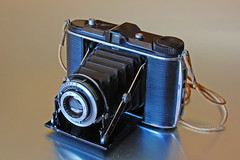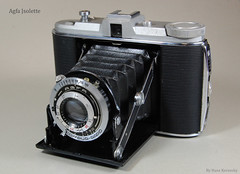Difference between revisions of "Isolette"
Hanskerensky (talk | contribs) m (changed photo dependencies to in pool Camera Wiki) |
Hanskerensky (talk | contribs) |
||
| Line 9: | Line 9: | ||
|image= http://farm4.static.flickr.com/3470/3984687578_bc7446c4e7_m.jpg | |image= http://farm4.static.flickr.com/3470/3984687578_bc7446c4e7_m.jpg | ||
|image_align= right | |image_align= right | ||
| − | |image_text= Early model Agfa Jsolette <br>by RaúlM}} | + | |image_text= Early model Agfa Jsolette <br>by RaúlM |
| + | |image_rights= with permission | ||
| + | }} | ||
* Year of release: 1938 | * Year of release: 1938 | ||
| Line 25: | Line 27: | ||
|image= http://farm6.static.flickr.com/5002/5274371955_2ba455deb5_m.jpg | |image= http://farm6.static.flickr.com/5002/5274371955_2ba455deb5_m.jpg | ||
|image_align= right | |image_align= right | ||
| − | |image_text= Late model Agfa Jsolette <br>by Hans Kerensky}} | + | |image_text= Late model Agfa Jsolette <br>by Hans Kerensky |
| + | |image_rights= with permission | ||
| + | }} | ||
* Year of release: 1945 | * Year of release: 1945 | ||
* Film Format: 12 exp. 6x6 on [[120 film|120 type rollfilm]]. | * Film Format: 12 exp. 6x6 on [[120 film|120 type rollfilm]]. | ||
Revision as of 12:59, 13 February 2011
The Agfa Jsolette is a horizontal-folding medium format camera made by Agfa from 1938 until 1950. This folder first came on the market as the Isorette but had a name change to Jsolette (pronounced Isolette) quite soon. There a 2 distinct models the early one and the later (post WW2) one. Operation of the Jsolette is completely manual.
Jsolette early model
The early model started life in 1938 as the Isorette but the name was soon changed to Jsolette. Production lasted till 1942. This model was in Germany also called the "Soldatenkamera" (soldiers camera). One of the very distinctive features is the topcover which is made of a plastic called "Trolitan". There were different lens/shutter combinations possible. It was a dual format camera. By using 2 internal mask halves it could be changed from the 6x6cm format to the 4.5x6 format.

|
| Early model Agfa Jsolette by RaúlM (Image rights) |
- Year of release: 1938
- Film Format: 12 exp. 6x6 or 16 exp. 4.5x6 on 120 type rollfilm.
- Shutter: Vario, Pronto, Prontor II, Compur or Compur-Rapid.
- Lens: Igestar 6.3/8.5cm, Apotar 4.5/8.5cm or Solinar 4.5/8.5cm.
- Viewfinder: optical direct vision viewfinder
Jsolette late model
The late model was made from 1945 till 1950. Again an unusual topcover material, this time cast-Hydronalium alloy (Nüral). There were different lens/shutter combinations possible. Other changes from the early model are to one film format only (6x6) and the addition of an accessory shoe (above the viewfinder).

|
| Late model Agfa Jsolette by Hans Kerensky (Image rights) |
- Year of release: 1945
- Film Format: 12 exp. 6x6 on 120 type rollfilm.
- Shutter: Prontor, Prontor-S or Compur-Rapid.
- Lens: Apotar 4.5/8.5cm or Solinar 4.5/8.5cm.
- Double exposure prevention.
- Viewfinder: optical direct vision viewfinder
References
Bibliography
Original documents
- McKeowns, Price Guide to Antique & Classic Cameras, 12th Edition 2005.